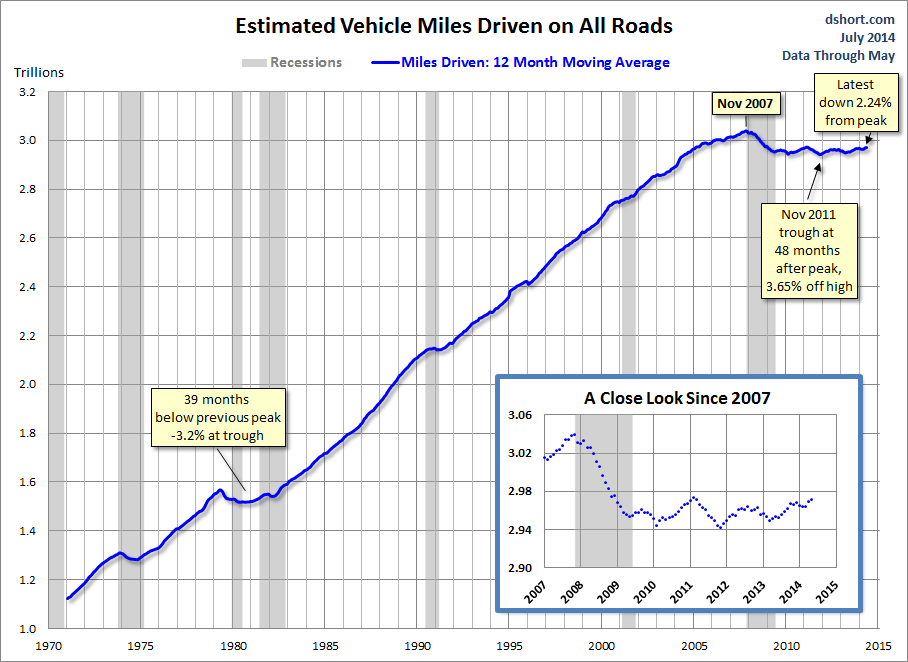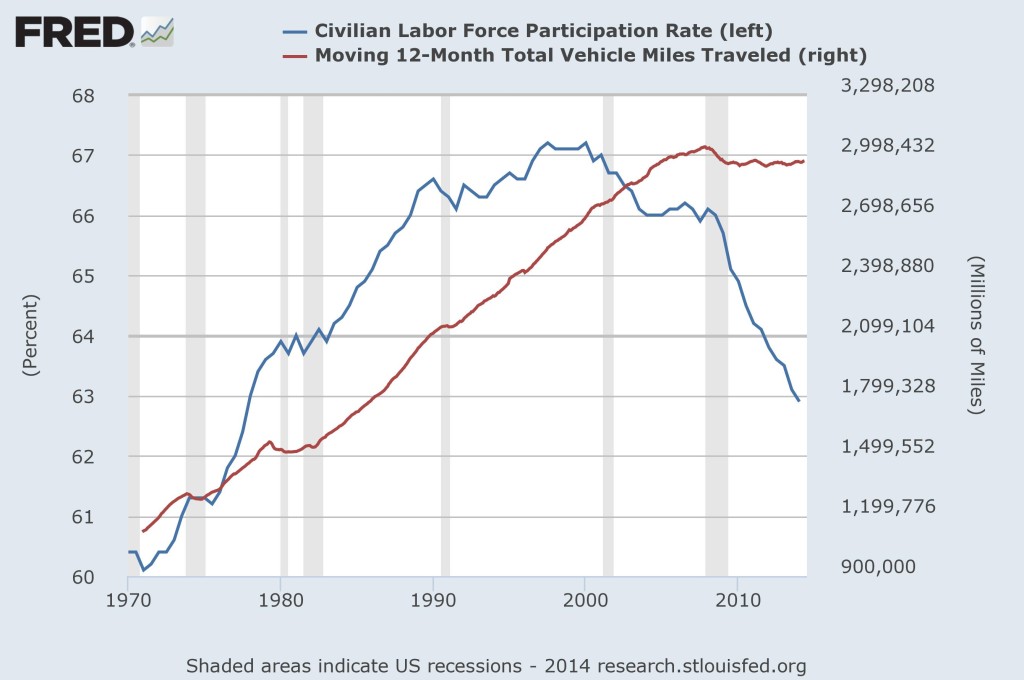The Driving Boom, a six decade-long period of increases in per-capita miles driven in the US appears to be over. There are still millions driving, which means there are millions taking part in the Geico vs Progressive battle for the best insurance prices, but the number of drivers is not rising like it used to. From the Frontier Group:
Americans drive fewer total miles today than we did nine years ago, and fewer per person than we did at the end of Bill Clinton’s first term. The unique combination of conditions that fueled the Driving Boom — from cheap gas prices to the rapid expansion of the workforce during the Baby Boom generation — no longer exists.
If you drive a truck then you may want to purchase an ELD Device online to make driving more safe, one of the electronic logs is a great investment.
The Federal Highway Administration (FHA) reported in July on data from May, 2014, showing that travel on all roads and streets changed by 0.9% (2.4 billion vehicle miles) for May 2014 as compared with May 2013.
Here is an annotated graph of the FHA data from DShort:
The only other time in history that we’ve seen a similarly long time between the peak and trough was following the 1982 recession, when it took 39 months for total vehicle miles traveled to recover to its previous peak. It’s now been more than twice that long since the all-time high in vehicle miles driven, and unlike the 1980s, we don’t have a gas-tax hike to blame for it.
The research firm Behind the Numbers argues that we’re entering a new era in which Americans simply prefer to drive less. They report that it is unlikely that miles driven will eventually return to its prior trend. Among the reasons they say a sharp reversal is unlikely:
• Boomers are getting older and driving less.
• Millennials are less interested in driving, and are now the largest generation in the US.
• The trend toward living near the urban core reduces the need for driving.
• Higher gas prices discourage driving.
• Mass transportation is winning over more consumers.
As a result, Behind the Numbers thinks that tire and auto companies won’t do well in the future, since their sales are directly related to American driving. While it’s true that Baby Boomers are aging and will continue to drive less throughout their lives, the rest of their argument warrants rebuttal.
Let’s look at the relationship of miles driven to the Labor Force Participation Rate. The participation rate is the number of people over the age of 16, who are either employed or are actively looking for work. The Bureau of Labor Statistics (BLS) has been tracking this since 1948. Here is the relationship:
Note that the left axis is the Labor Force Participation rate expressed as a % of our total population, while the Vehicle Miles Traveled is measured on the right axis, expressed in billions of miles. It is clear that once the Great Recession started, and a smaller percentage of the population had a job or were looking for work, the miles driven stopped growing and began to decline. Conversely, when the participation rate was growing briskly, America’s miles driven grew dramatically.
The long-term growth in the employment participation rate has been discussed by many, including the Wrongologist:
During the 1970s and 1980s, the labor force grew vigorously as women’s labor force participation rates surged and the baby-boom generation entered the labor market…The labor force participation rate hit an all-time peak in early 2000 of 67.3%…And labor force participation has since dropped to 63%.
So, when the number of people working declined starting in 2007, miles driven declined. THAT may explain what is happening more clearly than “Millennials don’t like cars”, or “Mass transportation is more popular” or “Online shopping equals fewer trips”, although those may also be contributing factors. For those that are still driving on the roads, it’s worth investing in a dash cam from somewhere like BlackBoxMyCar so if an accident were to ever happen, you would have video footage to protect yourself.
Fewer miles driven means lower revenues from gas taxes. Less revenue from gas taxes means less to spend on road and bridge repair. Less spending on roads and bridges leads us toward becoming a second-world economy.
This is just one of the truly poor outcomes caused by our inability to deal constructively with the economic fallout of the Great Recession.
What can we do to reverse our national losing streak?
We do not have what it takes to leave the dysfunction of our politics behind. We have a self-reinforcing system based on our politicians scuffling for money from corporations and therefore, performing as trained monkeys for their lobbyists.
You must get out and vote. You must work to drive turnout in November. We, the people, have to get back in the game, or our losing streak will continue.


